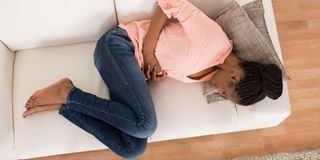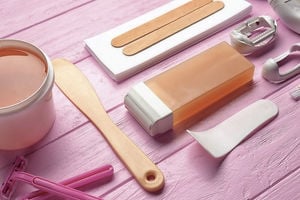I feel too dry down there, what's up?

Any changes in hormone levels can affect vaginal lubrication.
What you need to know:
- During sexual intercourse, lack of adequate foreplay, fatigue and relationship concerns can all lead to lack of lubrication
- Managing the dryness will depend on the cause, for instance, if the dryness is occurring as a result of hormonal medication, then it may be beneficial to get a good alternative
Dear doctor,
What works for vaginal dryness, is natural the best? I feel too dry down there, what's up?
Dear reader,
In normal circumstances, the walls of the vagina have a constant thin layer of fluid that keeps them lubricated. The hormone oestrogen helps to maintain the lubrication.
During sexual intercourse, increased lubrication is one of the physical signs of arousal and excitement.
Dryness can affect women of any age, though it is most common in menopausal women.
Any changes in hormone levels can affect vaginal lubrication due to pregnancy, breastfeeding, use of hormonal contraceptives, cancer treatment or anti-oestrogen medication for treating fibroids or endometriosis. Other causes of dryness include douching, vaginal infection, smoking, diabetes, auto-immune disease, use of antihistamines and some anti-depressants.
During sexual intercourse, lack of adequate foreplay, fatigue and relationship concerns can all lead to lack of lubrication. To manage it, there should be enough time for foreplay before sexual intercourse and you need to be relaxed. You can use a personal lubricant like KY jelly to avoid friction and injury. Also avoid douching, bubble baths and using perfumed soaps.
Managing the dryness will depend on the cause, for instance, if the dryness is occurring as a result of hormonal medication, then it may be beneficial to get a good alternative.
Any infection should also be treated. For post-menopausal women, products with oestrogen or DHEA that can be applied directly to the vagina. Avoid petroleum jelly and other oils as they may introduce infection and cam damage the latex on condoms. Also avoid perfumed soaps, douches and bubble baths.
Hello Dr Flo. I am done with child bearing and I am considering tubal ligation. What do I need to know before I go for it?
Reader
Dear reader,
Tubal ligation is the tying of the fallopian tubes. The fallopian tubes are thin tubes that provide a passageway for unfertilized eggs to move from the ovary to the uterus. Tying off the tubes means that you block the path of the egg, therefore preventing pregnancy.
Tubal ligation is regarded as a permanent contraceptive method, as it is difficult to reverse. The chance of getting pregnant after a tubal ligation is very low, less than 1 per cent.
The tubal ligation is done in the hospital or as an outpatient procedure. You are given anaesthesia to put you to sleep and medication to prevent pain. The surgeon makes two small cuts on the lower abdomen and first inflate it with gas, then insert thin tubes (laparoscopes) through the cuts, one to look through, and one to insert the instruments.
The fallopian tubes on both sides are then located and cut then sealed or tied. The cuts on the abdomen are then stitched and bandaged. You may go home the same day after the procedure.
During recovery, you may have bloating, pain at the site, abdominal pain, mild vaginal bleeding and dizziness. Keep the incision site clean and dry and report any severe symptoms or complications like infection or bleeding.
Refrain from heavy duties for about a week after the procedure. There is no need for another contraceptive method after tubal ligation has been done, though it is important to always practice safe sex.
For months now I have been experiencing a painless rash on my chest. What could be causing this?
Jackie
Dear Jackie,
A painless rash on the chest may be due to fungal or viral infection, it could be due to an inflammatory skin condition like psoriasis or eczema; it may be due to an allergic reaction to something that is in contact with your chest, or it may be due to acne.
Acne develops due to a combination of factors, which include hormonal changes, infection and the amount of natural oily substance (sebum) produced by your skin. The pimples develop when hair follicles are blocked by sebum and dead cells.
To manage the rash, clean your skin twice a day; in the morning, and in the evening before bed and shower after activities that make you sweat a lot. Use mild soap and a gentle towel. Do not scrub your skin too much while cleaning it, since it is already sensitive.
Have regular balanced meals with lots of fruits and vegetables, take at least 1.5 litres of water, get adequate sleep and exercise, avoid tobacco use and excessive alcohol consumption, use sunscreen and protect your skin from direct exposure to the sun and avoid using any harsh products on your skin. Since you have been having this rash for several months, it is advisable to see a skin specialist (dermatologist).
Dear doctor,
I had my first period when I was 14. During my teenage hood it was a painful experience courtesy of stomach cramps and other ailments that come with it. This somehow became better when I was in my twenties. Right now I’m almost 40 and the painful periods have come back. What could be causing this and how do I get rid of this problem?
Christine
Dear Christine,
Painful periods are referred to as dysmenorrhea. There are 2 types – primary and secondary. Primary dysmenorrhea occurs due to spasms or contraction of the uterine wall during menstruation and also due to release of some chemicals called prostaglandins and leukotrienes.
It starts within the first few years after the beginning of periods, and it affects almost half of all women. Secondary dysmenorrhea occurs due to an underlying problem e.g. fibroids, endometriosis or pelvic disease. It starts later in a woman’s life and treatment of the underlying problem will usually get rid of the pain.
Severe dysmenorrhea may be associated with longer, heavier periods, early age of onset of periods, family history of severe pain during periods, smoking, and obesity. Treatment involves medicines to manage the pain and reduce the uterine contractions.
Other measures that may help include physical activity, warm compresses and getting enough sleep. If the discomfort is very severe, oral contraceptives may be used. Pregnancy and giving birth may affect the severity of the discomfort in later cycles. It is advisable for you to be seen by a gynaecologist for examination and relevant tests, and appropriate treatment.




